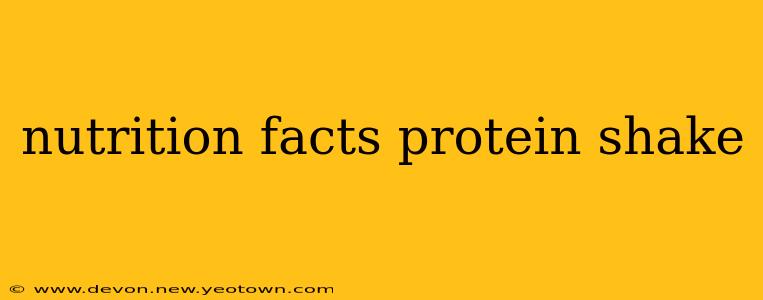Let's be honest, protein shakes have become a staple in many people's diets – whether you're a seasoned athlete, a busy professional, or simply someone looking to boost their protein intake. But have you ever really taken the time to understand the nutrition facts printed on that seemingly simple label? This isn't just about calories; it's about making informed choices to support your health goals. This article will guide you through the crucial information, answering common questions and helping you decipher the nutritional secrets within your protein shake.
What are the key things to look for on a protein shake nutrition label?
The key to understanding your protein shake’s nutritional profile lies in carefully examining several key components. This isn't about memorizing numbers, but rather understanding what those numbers represent and how they impact you. First, let's look at the big three: protein content, total calories, and sugar content.
-
Protein Content: This is the star of the show, right? Look for the grams of protein per serving. The amount needed depends on your individual goals and activity levels, but generally, aim for a shake that provides a significant portion of your daily protein needs. Remember that different protein sources (whey, casein, soy, etc.) have varying digestion rates and amino acid profiles.
-
Total Calories: Calorie counts are vital for managing your weight. Be realistic about your daily caloric needs and choose a shake that fits your overall dietary plan. Don't be fooled by low-calorie options that are packed with unhealthy fillers.
-
Sugar Content: This is often the hidden villain. Many protein shakes contain added sugars to improve taste, but excessive sugar can hinder your fitness goals and overall health. Opt for shakes with minimal added sugar or those sweetened with natural alternatives like stevia.
How many calories are in a typical protein shake?
The calorie count of a protein shake is highly variable. It can range from around 100 calories for a low-calorie, low-protein shake to over 400 calories for a high-protein, high-calorie blend. Several factors influence the calorie count, including the type and amount of protein powder, added ingredients (like fruits, nuts, or sweeteners), and the liquid used to mix the shake (water, milk, juice). It’s important to always check the nutrition label for the specific calorie information.
What are the common ingredients in protein shakes?
Protein shakes typically contain a primary protein source (whey, casein, soy, brown rice, pea protein, etc.), along with other ingredients that contribute to taste, texture, and nutritional value. These can include:
- Thickening agents: To give the shake a creamy consistency.
- Sweeteners: Artificial or natural sweeteners, contributing to the shake's flavor.
- Flavorings: Natural or artificial flavorings to enhance taste.
- Other additives: Vitamins, minerals, or other supplements.
Reading the ingredient list carefully helps you understand what you're consuming beyond just the protein.
Are there any potential downsides to consuming protein shakes regularly?
While protein shakes can be a beneficial part of a balanced diet, excessive or improper consumption can lead to several potential downsides:
- Digestive Issues: Some individuals experience bloating, gas, or diarrhea due to lactose intolerance (if using whey protein) or other sensitivities to ingredients.
- Kidney Strain: Excessive protein intake can place added stress on the kidneys, especially for individuals with pre-existing kidney conditions.
- Nutrient Imbalances: Relying solely on protein shakes for nutrition can lead to deficiencies in other essential vitamins and minerals.
Moderation and a balanced diet are always key.
What are the benefits of drinking a protein shake?
Protein shakes offer a variety of benefits, depending on your individual needs and goals:
- Increased protein intake: This is crucial for muscle growth and repair, especially after intense workouts.
- Convenient and quick: They provide a readily available source of protein, ideal for busy schedules.
- Supplementation of a balanced diet: Protein shakes can help you achieve your daily protein targets if you struggle to consume sufficient protein through whole foods.
This deep dive into protein shake nutrition facts is intended to empower you to make well-informed choices. Remember to always read labels carefully, consider your individual health needs and goals, and consult with a healthcare professional or registered dietitian if you have any concerns. Your body will thank you for it.

